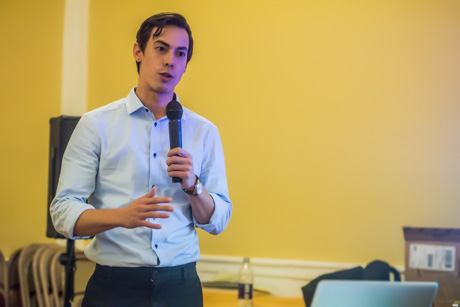Local municipalities with farmland should consider whether they want to address the issue of a zoning code for solar farms, Genesee County Planning Director Felipe Oltramari told members of the Agricultural and Farmland Protection Board at last night's meeting.
There are a couple of companies who have approached local landowners, Oltramari said, and if towns in the area want solar farms within their borders, they need to address it with a zoning code change and then decide how to regulate the farms.
Towns that do nothing, that currently have no permitted use for solar farms, will be deciding by default not to allow solar farms in those jurisdictions, Oltramari said.
If a land use isn't expressly mentioned in the local zoning code than it is completely prohibited.
Only the Town of Batavia has created provisions for solar farms, and it's a pretty bare-bones code at this point, Oltramari said.
The Town of Batavia took the action after SunEdison approached a local landowner about building a solar farm. An attorney representing SunEdison attended a couple of town meetings, but there's been no apparent progress with SunEdison since then and currently SunEdison is going through a Chapter 11 bankruptcy reorganization.
Since then, no other town has moved forward with solar farm zoning, but the Town of Oakfield is considering a solar farm on its land adjacent to its wastewater treatment plan and the Town of Alabama is considering a solar farm for the retired quarry in the town.
"I think that’s a perfect use for that, too," Oltramari said.
The Town of Batavia is also looking into a solar farm on its former landfill.
The big issue for agricultural land, however, is that a solar farm would take the land out of crop production.
Agriculture average typically leases for about $60 a year and solar companies will pay $1,500 per acre per year for 20 years.
"This has alarmed farmers that rely on rented land for their operations," Oltramari said.
Companies looking to set up solar farms are typically looking for 20-acre parcels and they must be within two miles of a power substation.
Donn Branton, chairman of the Farmland Protection Board, thinks landowners should look carefully at any deal offered by a solar company.
"The frosting sounds pretty good, but the cake batter seems to get pretty messy," Branton said.
There's a two-year planning process and the company decides what part of your farm it wants, he said, and then during construction they decide where the roads go.
"They pretty much have the run of your farm," he said.
And taking the land out of production could cause it to be reclassified as commercial property rather than farmland, increasing the property tax rate.
'It's something you want to investigate thoroughly with a legal service," Branton said. "$1,500 sounds great, but then you've got all the stipulations that go with it."
Oltramari recommended that towns -- and potentially landowners -- address issues such as preserving topsoil and herbicide use (in the event the land ever reverts to food production).
Zoning could also be used to limit the location and size of solar farms, buffer zones and visual screening.
Typically, in this area, solar companies are looking for 20-acre farms that produce two to four megawatts of energy.
One megawatt of solar energy could power 165 homes.
An energy generation facility (solar or wind) that produces more than 25 megawatts is exempt from local zoning laws, but such a farm in Western New York would need 125 to 200 acres of land, so Oltramari doesn't foresee such a farm coming to Genesee County.

